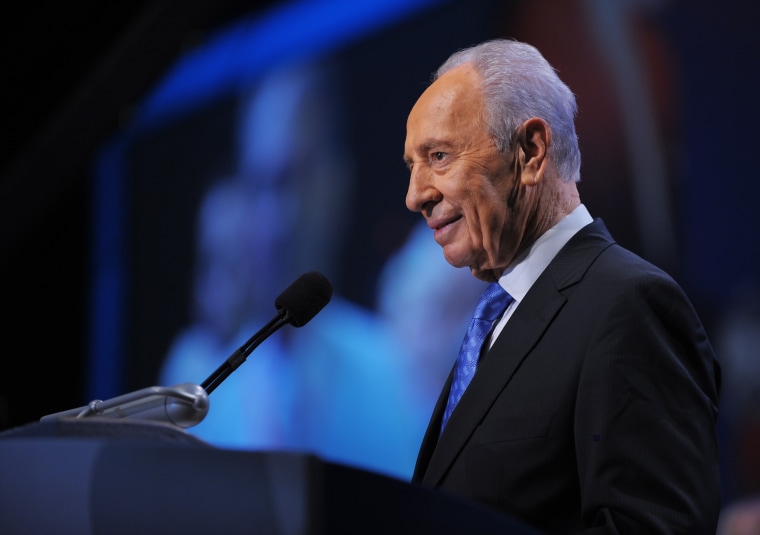Israeli President Shimon Peres cautiously endorsed new U.S. outreach to Iran following a longer-than-expected visit with President Barack Obama on Tuesday, telling The Associated Press that the American leader should be given a chance to resolve differences with Iran through negotiation.
Peres is the first top-level Israeli to visit the new president. A more important gauge of relations between Israel and the United States will come later this month, when Israel's hawkish new prime minister, Benjamin Netanyahu, meets Obama at the White House. Netanyahu has not ruled out military action against Iran and as a candidate opposed giving up land for peace with the Palestinians.
Peres said he emerged from the nearly hour-long session reassured that the United States under Obama will prize Israel's security and will not allow Iran to possess nuclear weapons.
"As long as the goal is clear, why not try all means?" Peres said of the latest U.S. overtures toward Iran. "If you can achieve it by engagement, God bless you."
Tentative overtures
That played down the potential for a split between Israel and its closest ally and defender over the best way to deal with Iran, a crucial Mideast power whose leader regularly calls for Israel's destruction.
Obama has made tentative and inconclusive overtures to Iran since becoming president in January. As a candidate he alarmed some in Israel, and some of the Jewish state's strongest U.S. backers, by pledging to meet Iran's leaders face to face if it would help U.S. goals in the region.
Iran denies it is trying to build nuclear weapons; Israel is presumed to already have them.
Peres said he made clear that Israel still considers Iran a mortal threat. He steered around a discussion of what either country might do if Iran spurned the offer of a new relationship with the United States, or if it appeared on the verge of getting the bomb.
"As long as they don't exclude any option, let ... the United States select the order of things," Peres said.
Peres, elected separately, said the new Netanyahu government will abide by agreements made by past Israeli leaders, including the pledge to negotiate for a separate Palestinian state alongside Israel.
Two-state peace agreement
Although Netanyahu has avoided any explicit endorsement of the so-called "two-state solution," Peres suggested that Netanyahu embraces an idea of peace that accomplishes the same thing. The new prime minister has said he welcomes negotiations and that he does not want to govern the Palestinians, Peres noted.
"So you can make whatever you want," of the terminology, Peres said.
Earlier Tuesday, Vice President Joe Biden challenged Israel to back a two-state peace agreement with the Palestinians and urged the Jewish state's new leadership to demonstrate its commitment to such a solution.
In a speech to the leading pro-Israel lobby in the United States, Biden said Netanyahu's government should stop constructing new Jewish settlements and ease restrictions on Palestinians.
"Israel has to work toward a two-state solution," Biden told the annual policy conference of the American Israel Public Affairs Committee. "You're not going to like my saying this, but not build more settlements, dismantle existing outposts and allow Palestinians freedom of movement."
Speaking to the same conference by satellite from Jerusalem, Netanyahu on Monday said his government is ready to resume peace talks with the Palestinians "the sooner the better" and outlined a "triple track" approach to peace with the Palestinians, a strategy that emphasizes political, economic and security planks to resolve the decades-long conflict.
He did not mention creation of a Palestinian state during his remarks.
